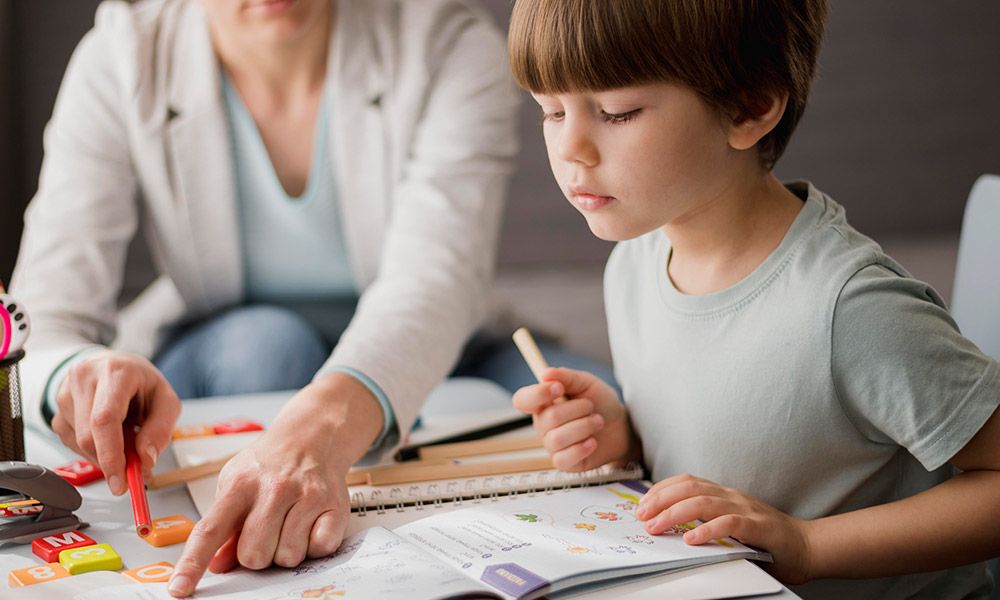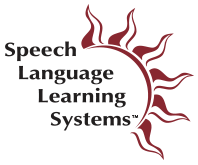Serving St. Louis families for over 25 years
Speech, Language & Dyslexia Specialists
Speech Language Learning Systems areas of specialty include content-based speech-language intervention for students experiencing listening, reading, writing, and oral expression difficulties due to speech-language processing concerns, early childhood speech-language delays, articulation/phonological speech disorders, including childhood apraxia of speech (CAS), and social communication disorders. Individual and group services are available including Executive Function Coaching to assist students with organizational skills essential to school success. Dyslexia Therapy is also available. Summer enrichment services are offered through our SLLS Meridian Academy which targets instruction to enhance Vocabulary, Reading, Writing, and Social Communication Success.

Screenings & Evaluations
Assessment services include speech and language screenings to determine if a full evaluation of skills is warranted. Various levels of evaluation are available dependent on areas of referring concerns.

Speech Language Therapy
Services for speech and language concerns can be evidenced in any of the following areas at the word, sentence and discourse level: Articulation, Voice, Fluency, Phonology, Morphology, Syntax, Semantics, and Pragmatics.
According to the American Speech-Language-Hearing Association (ASHA), speech and language disorders are among the most common disabilities for which students receive treatment services in schools-more than 1 million schoolchildren nationwide do so each year.
“Speech Therapy” services for improving articulation skills are offered to students who have been identified with an articulation or phonological speech delay and/or disorder, including childhood apraxia of speech (CAS). Therapy targets enhancement of speech intelligibility as students progress through a variety of clinician and student-directed activities targeting improvement of sound development at the word, sentence, reading, and conversational levels. Services from a PROMPT©-trained speech language pathologist for children with speech apraxia are also offered. Services for speech fluency disorders are also available based on therapist expertise and availability.
“Language Therapy” Areas of specialty include services to address developmental speech-language delays, spoken language disorders and written language disorders, including dyslexia. Specialization in providing contextualized speech-language intervention for students with speech-language processing disorders impacting listening and reading comprehension as well as oral and written expression. Integration of academic language demands into the intervention process facilitates language literacy success at the early childhood to high school levels.
In addition to serving students with language-based learning disabilities related to auditory processing, receptive and expressive language concerns, areas of special interest include phonological awareness and related language-based reading development for students exhibiting difficulty with developing language literacy skills.
Also an area of expertise is pragmatic language intervention for those diagnosed with Non-verbal Learning Disabilities, Asperger’s Syndrome, and Autism Spectrum Disorders. Social communication intervention for student experiencing pragmatic language concerns focus a great deal on perspective taking and on developing the metalinguistic skills important to communication success. Social Communication groups are offered with specialty in serving students with average to above average cognitive abilities and those without significant behavioral concerns. Purposeful Play groups for younger children address development of pivotal skills for the acquisition of language and early conversational functioning.
Metacognitive strategies are an important component to intervention and include direct instruction in learning strategy approaches that are appropriate for students at an advanced language level in order to teach planning and self-evaluation skills important for comprehension monitoring, written language development, and regulation of social communication.
School-based and office-based therapy is available, as well as in home programming for infants and toddlers. Telepractice services are also available as deemed appropriate by family and therapist providing services. Collaboration among parents, educators, and special service providers is an important component of therapy and reflects our philosophical belief that “teaming” is a key to long-term success. Consultative and school in-service presentations are also available.

Dyslexia Therapy
“Dyslexia Services” – SLLS offers therapeutic reading services for individuals with reading concerns, including those diagnosed with dyslexia and/or a learning disability in the area of reading from our Certified Structured Literacy Dyslexia Specialist, Lisa Cannon-Bearden, BSED, C.A.L.T., C-SLDS and Mary Beth Nilsen, MA, CCC-SLP, W.D.P., Certified Wilson Dyslexia Practitioner and Licensed Speech-Language Pathologist. All licensed speech language pathologists at SLLS are also S.P.I.R.E.® (Specialized Program Individualizing Reading Excellence) trained. Intervention models implemented are Orton-Gillingham (OG) based, which is still today considered one of the most reliable methods for teaching students with dyslexia to read. Named after Samuel Torrey Orton (1870-1948), a neuropsychologist, and Anna Gillingham (1878-1963), an educator and linguist, OG programs are characterized as language-based, multi-sensory, structured, and sequential in their approach to teaching the sounds that make up our language. Techniques are used to explicitly and systematically help with reading, writing, and spelling, as sounds are logically related to printed letter representations.
Lisa Cannon-Bearden is certified by the Center for Effective Reading Instruction (CEERI), a subsidiary of the International Dyslexia Association (IDA), the Academic Language Therapist Association (ALTA), as a “Certified Structured Literacy Dyslexia Specialist” (C-SLDS), previously recognized as “Certified Dyslexia Therapist (CDT)”. Reading intervention provides direct, explicit, and systematic teaching through use of “Take Flight: A Comprehensive Intervention for Students with Dyslexia” developed by the Luke Waites Center for Dyslexia and Learning Disorders at the Texas Scottish Rite Hospital for Children (TSRHC). Based on the original Orton-Gillingham model, techniques from The Multisensory Teaching Approach and Lindamood-Bell LIPS® program are also incorporated in this highly structured, sequential, multisensory, meaning-based program.
Mary Beth Nilsen, a licensed speech-language pathologist, is also a Certified Wilson Dyslexia Practitioner (W.D.P.) The Wilson Language Training Model was developed by Barbara Wilson and includes four structured literacy programs to meet the needs of beginning learners as well as programs to close the reading gap for struggling students. These research-based programs for all ages include Fundations®, Wilson Just Words®, the Wilson Reading System®, and Wilson Fluency®/Basic.
While intervention is individualized to meet student need, services offered at SLLS provide a structured and intensive phonetic approach to teaching reading that emphasizes phonological awareness, sound/symbol relationships, word attack skills, reading accuracy, reading fluency, and linguistic patterns. “Language-based reading services” are offered by our licensed speech-language pathologists trained in phonological therapeutic interventions such as SPIRE®, SPELL-Links™, and LIPS® as well as a variety of reading comprehension and written language strategies.

Social (Pragmatic) Communication Groups
“Social (Pragmatic) Communication Services” – offer opportunities to improve students’ ability to reason and communicate socially with greater success through a cognitive-behavioral approach to intervention. Individual services as well as groups and intervention dyads are led by licensed speech-language pathologists who introduce strategies for increasing common language used for thinking more socially, an important precursor to the development of related social skills.
While intuitive for many individuals, those with social communication challenges may benefit from programs that facilitate their pragmatic language learning more explicitly. Many language strategies are introduced to assist students in improving their social communication success including “Pathways for Social Reasoning and Problem Solving,” Social Stories™, and Social Thinking® intervention methods. “Social Thinking®” can be described as an approach used to facilitate the process of thinking socially before acting socially and was originally coined by Michelle Garcia Winner to describe therapy programs she developed to assist individuals with social cognitive challenges. Her innovative work, along with many others such as Tony Attwood, Carol Gray (Social Stories™), Elizabeth A. Laugeson and Fred Frankel (PEERS®) have inspired the social communication services that SLLS offers. Intervention provides a framework for stimulating students’ social thinking and includes the use of a variety of motivating curriculums and strategies (i.e., Michelle Garcia Winner, Carol Gray, visual organizers to record and reflect on the social reasoning process). While exploring social communication, students are encouraged to increase their awareness and knowledge of social thinking vocabulary/concepts, social expectations, and behaviors that lead to successful social experiences. Additionally, strategies for modifying behaviors to increase social success are introduced for teenagers and, based on need, may target social skills for conversing, electronic communication, choosing and maintaining friendships, appropriate use of humor, get togethers, good sportsmanship, teasing and embarrassing feedback, bullying and bad reputation, and handling disagreements, rumors, and gossip. Parents are invited to attend the last 5-10 minutes of each session for a lesson review to increase opportunities for generalization of skills outside the intervention setting.
For group participants, individual consultations with the speech-language pathologist are available for families who desire more in-depth assistance in facilitating carry-over of the communication strategies introduced. A file review, parent intake, and social communication screening and/or assessment is required to establish appropriate intervention targets and ensure optimal group placement, if applicable. Social Communication services offered at SLLS specialize in serving students with average to above average cognitive abilities and those without significant behavioral concerns. Given community health concerns, group offerings may be offered via telepractice or hybrid (in-person and telepractice) models. Please contact us for additional information about social communication group schedules.
While the entire staff at SLLS have attended multiple training seminars with Michelle Garcia Winner, Dana E. Gooden-Schroeder, M.A., CCC-SLP, completed the Social Thinking® Clinical Training Program (formerly called Mentor Training) with Michelle Garcia Winner in January 2009. SLLS Director of Social Communication Services, Megan Reynolds, M.A. CCC-SLP, completed the Clinician Training Program Level 1 at Social Thinking Boston in November 2017. SLLS programs offered, including its teacher or leader, is not affiliated with, nor has it been reviewed, approved, or endorsed by Michelle Garcia Winner and Think Social Publishing, Inc.

Learning Skills Development
Learning Skills Development is also available for students experiencing mild concerns who may benefit from the use of language-based strategies to improve functioning and academic performance. Instruction in vocabulary, reading, writing, organization and time management strategies is offered.

Executive Function Coaching
Executive functions are a set of cognitive skills used for self regulating the planning, completing, and evaluation of tasks organizationally, as well as monitoring social communication exchanges. Language is used to mediate executive function skills, essential for setting goals and problem solving.
As licensed speech-language pathologists, our expertise in all areas of language offers us unique insight and training into how to target language needs that may be contributing to breakdowns in organization skills related to managing time, tasks, and materials. Developing stronger metacognitive and organized language skills can be critical factors when applying strategies that assist students in becoming more independent and organized learners. Support areas include but are not limited to: Self-Evaluation and Self-Regulation skills related to Time and Materials Management, Homework Completion, Test Preparation, Long Term Project Planning, Written Expression, Reading Comprehension, and Social Communication.

Technology-based Programs
“Fast ForWord®“ is an intensive, evidence-based reading and language software program that targets how the brain perceives and processes sounds. Developed by world-renowned neuroscientists, Fast ForWord® targets the building blocks for literacy development (sound discrimination, individual word sounds {phonemes}, words, sentences, paragraphs, and complete text), while also addressing the cognitive underpinnings of reading (memory, attention, and processing speed). Fast ForWord® Reading (grades K-5) and Fast ForWord® Literacy (grades 6-12), adapts to each students unique learning pace while addressing auditory processing, and language-related reading challenges. Research and national field trials have continued to show positive outcomes in participants’ auditory discrimination skills, ability to follow directions, and overall language/reading development. “Fast ForWord® Reading Series“ and “Reading Assistant Plus™“ are also technology-based programs available for increasing processing efficiency, improving reading fluency, and strengthening critical language-based reading comprehension skills.

Telepractice Services
The American Speech-Language-Hearing Association (ASHA) defines telepractice as the delivery of services using telecommunication and Internet technology to remotely connect clinicians to clients, other health care providers, and/or educational professionals for screening, assessment, intervention, consultation and/or education. ASHA approved telepractice as an appropriate model of service delivery in 2005, as both the primary mode of service delivery and/or may supplement in-person services (known as hybrid service delivery). While SLLS has offered telepractice services since 2015, the appropriateness of this model of service delivery should be decided by the family and therapist for each individual child.
